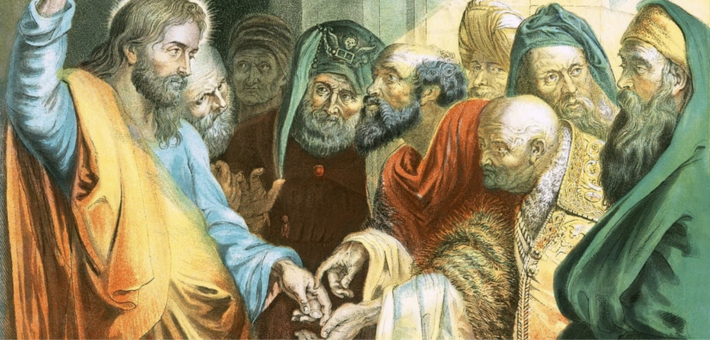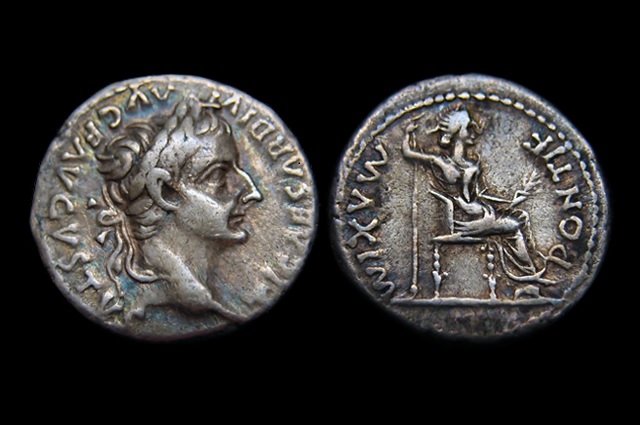Commentary on Matthew 22:15-22
In Matthew 22:15-22, the Pharisees come to the fore and send their disciples to Jesus along with the Herodians to slyly confront and debilitate Jesus with a “divide and rule” tactic, which is an imperial stratagem by which emperors cement power divisively. In fact, the coalition between the Pharisees and the Herodians is highly unexpected because whereas the former is critical of Rome, the latter aligns with the Roman Empire because they are a political party supporting the Herodian dynasty, a puppet of the Roman Empire. But their common interest binds them together, which is to impair Jesus’ authority and crush his “kingdom of God” movement by asking him a politics-driven question, “Is it lawful to pay taxes to Caesar or not?” (21:17).
They are confident that this question will trouble and alienate him because he would find it difficult to answer either way. A simple “yes” seemingly contradicts his general teaching about God since true loyalty is rendered to God only. A dauntless “no” will make him an anti-imperial radical revolutionary. They expected Jesus to choose an “all-or-nothing” position whose logic is “If you give everything to God, there is nothing you can spare to give to Caesar, or vice versa.” If their trapping goes as planned, he will be barbecued further by his opponents. Subsequently, his authority will be questioned and feeble, and his followers or those who heard him teaching would be confused and divided. Some of them may think that Jesus is too radical to follow. Others would be in danger if they follow Jesus’ stance that they not pay taxes to Caesar.
To set the stage for their trap, the Pharisees and the Herodians take Jesus for a ride and said: “Teacher, we know that you are sincere, and teach the way of God in accordance with truth, and show deference to no one, for you do not regard people with partiality” (22:16). This praise of Jesus is a bait to snarl him if he moves away from his teaching concerning God-only-loyalty, which is referred to as “in what he said” (22:16), which refers to all he taught and said in his ministry, including but not limited to teaching about the kingdom of God and his righteousness (6:33). Interestingly, while talking about great teachings of Jesus, they are not interested in the real change of people or fruits of his ministry through which, for instance, the downtrodden are encouraged to live with hope in God. For Jesus, good teaching does not stay with knowledge, but it must bear fruit.
But knowing their malice, Jesus said: “Why are you putting me to the test, you hypocrites? Show me the coin used for the tax” (22:18-19). Putting someone to the test is evil. They are called hypocrites because they know and teach who God is, but they do not do what they teach (see also, 23:2). They are supposed to know loyalty to God does not necessarily lead to the rejection of the empire. So, he does not answer their question directly because they want to get him in trouble under the guise of the legal language of lawfulness. Even if he says either yes or no, he still gets in trouble because “yes” means a seeming rebuttal of his teaching focused on loyalty to God, which may bring about divisive responses from his followers or other people, and “no” means a blow to Rome, but it would cause him to stand at the brink of the revolutionary war against Rome.
Instead of taking on either a yes or no answer, Jesus asks them to show him the coin used for the tax, which is a denarius—the usual daily wage reflecting people’s blood, sweat, and tears. He knows that everyday life is hard and that the sustenance of life is crucial to ordinary people. This coin represents their hard work. They are part of the local economy no matter how complex or abusive it may be. Recognizing the Roman Empire’s economy and politics, Jesus asks: “Whose head is this and whose title?” (22:20). He seems to recognize that not all things are evil in the Roman Empire. An “all-or-nothing” worldview is naive. As there is light and darkness in the world, people must face both and live wisely, doing the will of God. The Pharisees answered, “Caesar’s,” which is a correct answer. Then, Jesus said to them: “Give therefore to Caesar the things that are Caesar’s and to God the things that are God’s” (22:21).
Jesus’ answer above is evasive but penetrating. On the one hand, he could avert the Pharisees’ trap. But on the other hand, it rings true to all his hearers, both his followers and his opponents, because ultimately, theological or ethical stances must be determined by each person. In other words, one must read and analyze the realities of the world and their relationship with God. Since all actions are the result of their interpretation, different people may think differently about the intersections of the empire/world rulers and God. Jesus pushes people to think for themselves and determine what is best for them when they engage in the world. He seems to say: “Take a stand yourself. It’s your decision by which you can prove what kind of person you are.” In this way, he does not close the door on the Pharisees: “Is it lawful to pay taxes to Caesar or not?”
So, people are left wondering what it means to live in an imperial world that God is supposed to rule. How can they know which or what belongs to God or Caesar? If they know one way or another, they must be bold and loyal to their interpretation. In other words, they must bear the fruit of their interpretation. If they do not do what they believe or decide, there arises another form of hypocrisy. In this regard, Jesus calls the chief priests and the elders hypocrites (22:17), and his view holds true because they were amazed by Jesus’ answer but they simply left him and went away without further engagement or proper words of change or commitment (22:22).
In the end, what Jesus teaches us is a critical interpretation of the world, fearless determination thereafter, and conscientious engagement in the world, based on what we believe is true. From Matthew’s perspective, the goal of life is not merely to defeat the empire or adopt an “all-or-nothing” policy but to love people, including enemies, strive after his kingdom and righteousness, and live in hope between now and the future. Until the end, they must continue to pursue the way of God progressively and radically.



October 22, 2023